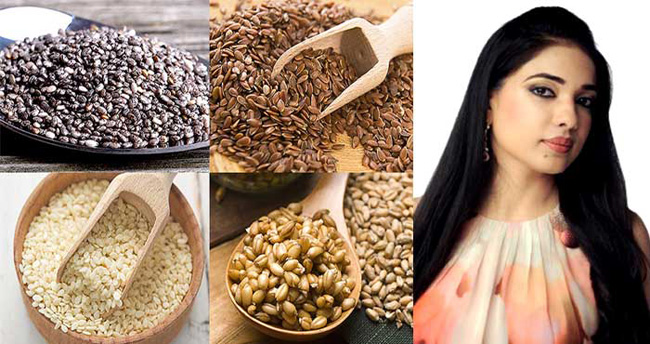
We all have heard about nuts. But, what about seeds? These tiny beads are popping up everywhere. Super seeds deserve to play a much greater role in our diet. Add a spoonful to your morning muesli. They are nutritional powerhouses – loaded with dietary fiber, vitamins and minerals.
Chia seeds have stolen the limelight in the supermarket, showing up everywhere – from granola bars, biscuits, beverages etc. Chia is packed with omega-3-fatty acid. Because they have mild and nutty flavor, they are easy to add to a variety of foods and drinks.
When fiber in the chia seeds mingle with the digestive liquids in the gut, it swells to form a gel, which can aid in improving blood sugar control and promote satiety to help keep your junk food temptations at bay. Chia is not considered a complete protein as it contains low levels of essential amino acid lysine. Since it has a fairly benign flavor, so it can be added liberally to dishes like cereal, yogurt, cottage cheese and salad without impacting the taste of the dish.
Hemp seeds
These are soft to the bite, hemp seeds also called hemp hearts can provide nourishment to your muscles by providing with high quality proteins. Protein value of hemp has been found in number of plant based foods such as grains, nuts, and legumes. So hemp seeds contains full arsenal of muscle building essential amino acids, which can be found find in meats, eggs and dairy products. These tiny heart shaped super seeds are loaded with range of vital minerals including energy boosting iron, bone building calcium and magnesium. It has also been researched from Harvard University that higher intakes of magnesium are associated with 30% lower risk of heart diseases. Hemp also contains 3:1 ratio of omega-6 to omega-3 fat, which is considered to be anti-inflammatory in the body.
Pumpkin seeds
The bevy of nutritional benefits of pumpkin seeds also includes iron, magnesium and testosterone-boosting zinc and vitamin K. Zinc is essential for better hair growth in both male and females.
Flax Seeds
These are rich in omega-3-fatty acid, dietary fiber and lignin. Flax seeds reduces belly fat and even lowers cholesterol. The researchers surmised that the biological mechanism could be linked to high level of lignin in flax. Lignin is plant compound that may help to improve blood flow in the body. Whole Flax seeds have hard outer shell that makes it difficult for our digestive track to break into. For this reason flax seeds need to be grounded into a powder, if proper nutritional goodness can be accessed. It is preferred to buy whole seeds and grind them at home.
Sunflower Seeds
Sunflower seeds are the cheapest seeds available in the market today. These seeds are also a good source of body-friendly unsaturated fat along with the range of minerals such as magnesium, copper and manganese. But the sky-high levels of vitamin E are their nutritional claim to fame. From cereal to tuna salad to pasta to yogurt to smoothies, a handful of sunflower seeds can add a nutritional boost to a wide range of everyday meals.
Sesame Seeds
Sesame seeds deliver a dairy free source of calcium. Sprinkle sesame seeds into your daily menu and you will also take in copper, a mineral essential for numerous enzymatic reactions in the body, including those involved in energy production and the performance of your nervous system. Even Black sesame seeds are thought to possess higher anti – oxidant activity than the most customary beige variety. Add them to roasted vegetables, grilled salmon, sautéed greens and even burger mixture.
For more information on seeds, e-mail the writer at info@wellnessbeyonddiet.com. She can also be contacted at 08427162181
